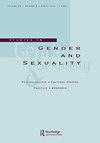歇斯底里的团结:对美国当代性权利和生殖权利问题的反思
Q3 Social Sciences
引用次数: 0
摘要
本文对愤怒、慢性疼痛、疾病和身份进行了反思。作者以歇斯底里作为概念出发点,利用精神分析理论和作者的生活经历来识别和扩展女性主义在这个政治时刻愤怒的潜力。通过为创伤和歇斯底里的精神分析概念提供一个具体的视角,作者通过个人和理论的视角来处理生殖正义问题,为政治行动提供了路线图。本文章由计算机程序翻译,如有差异,请以英文原文为准。
Hysterical Solidarity: An Embodied Reflection on Contemporary Sexual and Reproductive Rights Concerns in the United States
ABSTRACT This essay provides a reflection on anger, chronic pain, illness, and identity. Using hysteria as a point of conceptual departure, the author makes use of psychoanalytic theory and the author’s lived experience to identify and expand upon the feminist potential for anger in this political moment. By contributing an embodied perspective to psychoanalytic notions of trauma and hysteria, the author approaches the question of reproductive justice through a personal and theoretical lens that offers a road map for political action.
求助全文
通过发布文献求助,成功后即可免费获取论文全文。
去求助
来源期刊

Studies in Gender and Sexuality
Social Sciences-Gender Studies
CiteScore
0.80
自引率
0.00%
发文量
15
期刊介绍:
Beginning in the final two decades of the 20th century, the study of gender and sexuality has been revived from a variety of directions: the traditions of feminist scholarship, postclassical and postmodern psychoanalytic theory, developmental research, and cultural studies have all contributed to renewed fascination with those powerfully formative aspects of subjectivity that fall within the rubric of "gender" and "sexuality." Clinicians, for their part, have returned to gender and sexuality with heightened sensitivity to the role of these constructs in the treatment situation, including the richly variegated ways in which assumptions about gender and sexuality enter into our understandings of "normality" and "pathology."
 求助内容:
求助内容: 应助结果提醒方式:
应助结果提醒方式:


